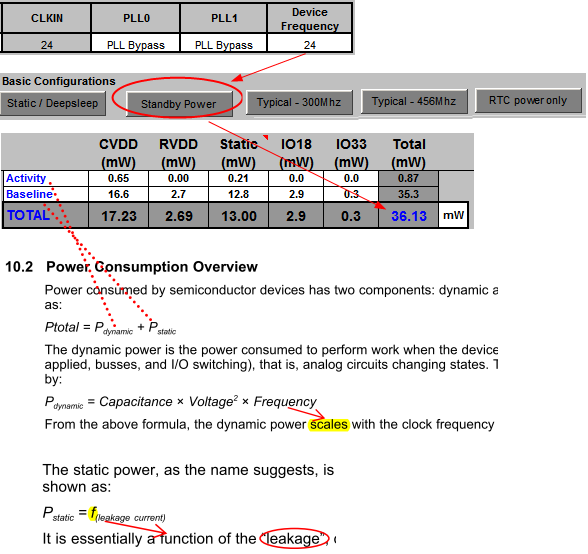Hi,
I would like to ask some questions with L138 power consumption.
CLKIN < 24MHz
In OMAP L138 power consumption spreadsheet CLKIN is fixed at 24MHz.
On page 208 of SPRUH77, OMAP-L138 C6-Integra DSP+ARM Processor Technical Reference Manual
, §10.2, Pdynamic is shown to be proportional with frequency:
Pdynamic = C × U2 × Frequency
Therefore, although the spreadsheet doesn't allow entering lower CLKIN values such as 12 or 16MHz, can we just use simple division (/2 when CLKIN=12M, /1.5 when CLKIN=16M) to obtain power consumption when a lowering CLKIN is used?
Activity VS Baseline
In power consumption spreadsheet we see "Activity" and "Baseline" rows.

In §10.2 Power Consumption Overview of SPRUH77, OMAP-L138 C6-Integra DSP+ARM Processor Technical Reference Manual we see Ptotal consists of Pdynamic and Pstatic.
Does there exist a correspondence such that:
Activity ↔ Pdynamic
Baseline ↔ Pstatic
?
However, there are also evidences disagreeing with this. When the button "Typical 300MHz" is pressed, the baseline power rises from "standby" button values:
CVDD: 16.6(standby) ↑ 98.2(300MHz)
Total: 35.3(standby) ↑ 116.9(300MHz)

According to definition Pstatic = f(leakage), if leakage is unchanged, pstatic is also unchanged. If baseline = Pstatic, then baseline is also unchanged. I have no knowledge on whether ↑ CPU frequency to 300MHz also ↑ leakage so I cannot infer which has caused baseline ↑. However, if ↑CPU frequency does not cause ↑leakage, then from the increase of baseline from standby mode to 300MHz mode, we could conclude that baseline ≠ Pstatic.
Could anyone clarify on the definition of "baseline" and "activity"?
Zheng
